Icon Qcon PRO X User Manual
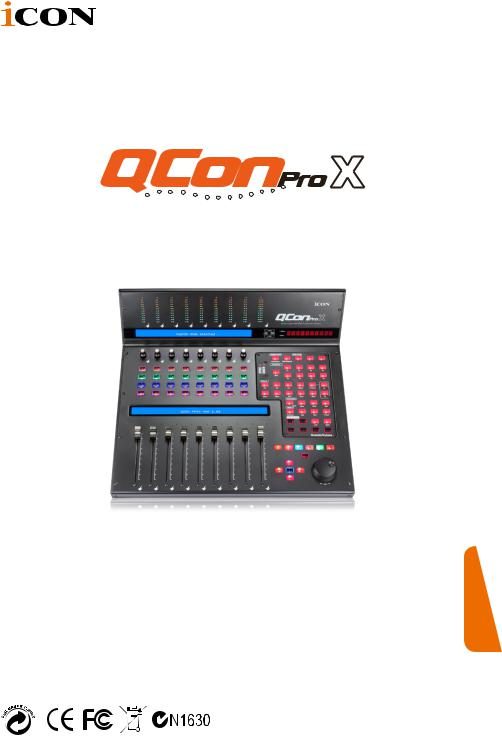
MIDI/Audio control surface with motorized faders for production
User manual
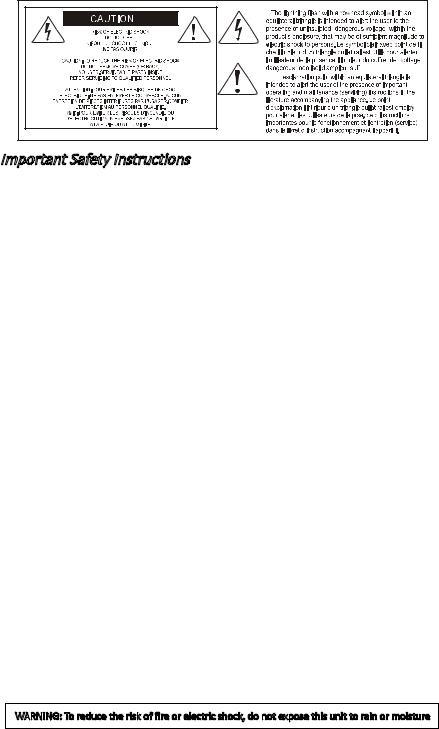
Important Safety Instructions
1.Read this manual thoroughly before using this unit.
2.Keep this manual for future reference.
3.Take notice of and comply with all warnings included in the user's manual or indicated on the appliance.
4.Follow all instructions included in this manual.
5.Do not expose this unit to rain or moisture. Avoid having water or other liquids spilled on this unit.
6.When cleaning the cabinet or other parts of this appliance, use only a dry or slightly damp soft cloth.
7.Do not block any ventilation openings or interfere with the proper ventilation of this unit. Install in accordance with the manufacturer's instructions.
8.Do not use or store near any heat sources such as radiators, heat registers, stoves, or other heatproducing appliances.
9.Do not interfere with the safety purpose of the polarized or grounding-type plug. A polarized plug has two blades with one wider than the other. A grounding-type plug has two blades and a third grounding prong. These are designated for your safety. If the provided plug does not fit into your outlet, consult an electrician.
10.Protect the power cord from being walked on or otherwise damaged by items placed on or against them. Particular attention should be given to the plugs, receptacles, and the point where the cord exits the appliance.
11.To avoid the risk of electrical shock, do not touch any exposed wiring while the unit is in operation.
12.Only use attachments/accessories specified by the manufacturer.
13.Unplug this unit and all connected electrical equipment during lightning storms or when left unused a long period of time.
14.Refer all servicing to qualified service personnel. Servicing is required when the appliance has been damaged in any way or fails to operate normally.
WARNING: To reduce the risk of fire or electric shock, do not expose this unit to rain or moisture
Contents |
|
Introduction............................................................................................................................ |
4 |
What's in the package?.......................................................................................................... |
4 |
Features................................................................................................................................. |
5 |
Top Panel Layout................................................................................................................... |
7 |
Rear Panel Layout............................................................................................................... |
12 |
Getting Started .................................................................................................................... |
13 |
Cubase................................................................................................................................. |
15 |
Nuendo................................................................................................................................. |
16 |
Logic Pro.............................................................................................................................. |
17 |
Samplitude........................................................................................................................... |
18 |
Bitwig.................................................................................................................................... |
20 |
Reason................................................................................................................................. |
21 |
Reaper................................................................................................................................. |
22 |
Studio One........................................................................................................................... |
23 |
Abelton Live......................................................................................................................... |
24 |
Pro Tools.............................................................................................................................. |
25 |
iMapTM Software for Mac OS X............................................................................................. |
27 |
Installing iMapTM Software for Windows............................................................................... |
28 |
Assigning DAW Mode (Mackie Control/HUI) or Defining MIDI Functions with iMapTM......... |
30 |
Assigning DAW Mode (Mackie control/HUI) Using iMapTM........................................... |
31 |
Assigning MIDI Messages in User-Defined Mode Using iMapTM.................................. |
33 |
Control Element Setup in User-Defined Mode..................................................................... |
35 |
Other Functions in iMap™................................................................................................... |
37 |
Firmware upgrade................................................................................................................ |
38 |
Restore the factory default settings...................................................................................... |
40 |
Specifications....................................................................................................................... |
41 |
Services............................................................................................................................... |
42 |
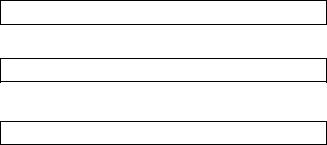
Introduction
Thank you for purchasing the ICON Qcon Pro X Midi/Audio control surface. We sincerely trust this product will provide years of satisfactory service, but if anything is not to your complete satisfaction, we will endeavor to make things right.
In these pages, you'll find a detailed description of the features of the Qcon Pro X, as well as a guided tour through its front and Rear panels, step-by-step instructions for its setup and use, and full specifications.
You'll also find a warranty card enclosed---please don't forget to fill it out and mail it so that you can receive online technical support at: www.iconproaudio.com. And so we can send you updated information about this and other ICON products in the future. As with most electronic devices, we strongly recommend you retain the original packaging. In the unlikely event the product must be returned for servicing, the original packaging (or reasonable equivalent) is required.
With proper care and adequate air circulation, your Qcon Pro X will operate without any trouble for many years. We recommend that you record your serial number in the space provided below for future reference.
Please write your serial number here for future reference:
Purchased at:
Date of purchase:
What's in the package?
●● Qcon Pro X USB-MIDI Controller x 1pc ●● CD x 1
App software – iMap (Mac & Windows) User manual & QSG
DAW software – Samplitude Pro X2 Silver ICON edition ●● Quick Start Guide x 1
●● USB2.0 Cable x 1 ●● AC adaptor x 1pc
4
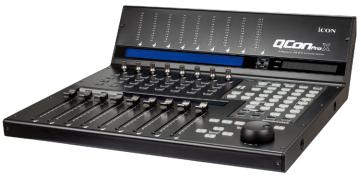
Features
●● 8 touch-sensitive motorized channel faders with 10-bit resolution
●● 1 touch-sensitive motorized fader for master channel with 10-bit resolution
●● 12-segment LED level metering bridge equipped for channel (mono) and master channel (stereo) level metering (Angled and located at the top for easy reading)
●● 8 x dual function encoder knobs (Enter & rotate)
●● The multi-colour surround LED display will change colour according to the controlling parameter for easy control (Cubase only)
●● 11-segment LED surrounding the encoders to indicate the rotating position.
●● Large dual backlit LCD displays show channel name (lower LCD) and different control parameters (upper LCD) for each channel
●● 12-segment LED display showing time location of your project in either SMPTE or BBT format.
●● Jog wheel shuttle for fast search and control
●● Illuminated buttons for each channel including Rec-enable, Solo, Mute, Select and Monitor
●● 6 illuminated transport buttons including Play, Stop, Rec, Rewind, Fast forward and Loop
●● Illuminated zoom key with 4 direction keys
●● 9 illuminated assignable MIDI function buttons (Depended on DAW) ●● Expandable to 32-channels control surface with 3units of Qcon Pro XS ●● 3 x USB expansion ports are included
●● Different expansion control units (modules) such as joystick, extra buttons, or knobs will be available (optional)
●● User A & User B RCA connectors for connecting with pedals
●● Class-compliant with Windows XP, Vista (32-bit), Windows 7 (32-bit & 64-bit), Windows 8 (32-bit & 64-bit), Windows 10 (64-bit) and Mac OS X (IntelMac)
●● USB 2.0 high speed connectivity
5
●● Mackie control build-in for Cubase, Nuendo, Samplitude, Logic Pro, Reaper, Studio One, Bitwig, Reason and Abelton Live.
●● Mackie HUI protocol build-in for Pro Tools
●● Hardware switch for DAW auto-detect mode or DAW manual-select mode ●● Optional DAW aluminium panels are available including Cubase/Nuendo,
Samplitude, Logic Pro, Reaper, Studio One, Bitwig, Reason, Abelton Live, and Pro Tools to trigger corresponding DAW settings in DAW auto-detect mode
●● Different DAW PVC overlay are included - Cubase/Nuendo, Samplitude, Logic Pro, Reaper, Studio One, Bitwig, Reason, Abelton Live, and Pro Tools
●● iMap - Self midi mapping software is provided for user-defined mode (MIDI Learn) ●● Firmware upgrade available simply via USB connection and iMap software.
●● Superior build quality and robust metal casing with Kensington lock port ●● 12V/2.5A power adapter included
6
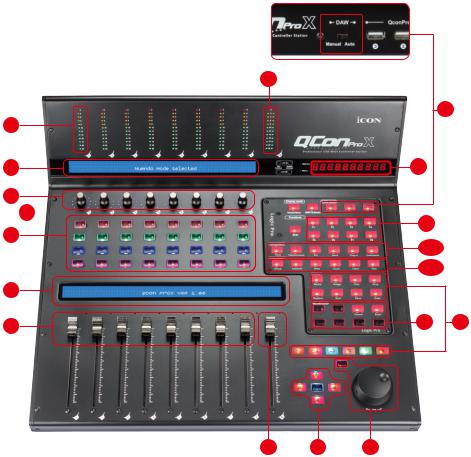
Top Panel Layout
5
4
1
6
6a
8a
2
3a
3b 8c 8d
9
7
11
10a
10b
8b 8e
Note: Function operates slightly difference between DAWs. Please refer to your DAW manual for each function and overlap the provided labeling template according to your current using DAW. The following description is based on the functions that operate in Apple Logic Pro.
1. Upper LCD Display
The two-line backlit LCD display shows the parameter values as you adjust them and also provides feedback about channel selections, operating modes, and more.
2. Lower LCD Display
The two-line backlit LCD display shows the channel name.
3a. Channel faders
The eight 100mm motorized faders are generally used for controlling the track volume of your DAW. Depending on your DAW, you may use the “Flip” button to
7
switch the function of these faders to change other settings. They are all touch sensitive to allow override automation the moment you touch a fader. Also, they are motorized; they will automatically move to reflect the current level of the selected channels in your DAW application. Any automation recorded in a
project will be reflected by the fader positions. Any parameter adjustments made with these faders will be displayed directly above on the LCD display (upper LCD).
3b. .Master fader
This 100mm motorized fader operates the same as the other 8 faders. It controls your DAW software's master channel fader. Any parameter adjustments made
with this fader will be displayed directly above on the LCD display (upper LCD).
Note: Except Pro Tools – Pro Tools software is designed in such a way that the fader next to your last channel fader always acts as the master channel fader.
4. Channel level metering (mono)
The 12-led showing the associated channel level.
5. Master channel metering (stereo)
The 12 x 2-LCD showing the master channel level.
6. Dual Function Encoders with Multi-Colour Surround LED
The dual functioned encoder acting as a push-button and a rotary control.
When an encoder is pressed, it may be used to change modes of operation or to change what appears in the display above the channel strips. When an
encoder is rotated, depending on its assigned function, it can be used to adjust
a channel’s pan, send level, or plug-in parameters.
6a. Encoder LED
The 11-LED surrounding the encoder lights up to indicate the relative position of the rotation without having to look at your computer. On Cubase, the colour of the surround LED will change according to the controlling parameter.
7. Time display
This display shows the time location of your project in either SMPTE or BBT format.
8. Control buttons
8a) Recording channel control buttons section
REC buttons - Activate and deactivate the recording state of the
associated channel. The switch will light red when the channel is armed.
SOLO buttons - Turn On and Off the solo state of the associated channel.
The switch will light green when the channel solo state is on and other
channels will be muted. You could solo multiple channel by pressing SOLO
8 buttons on additional channels.
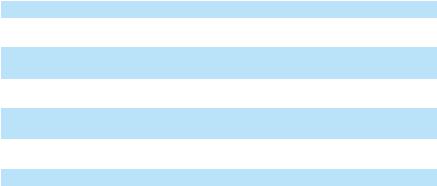
MUTE buttons - Activate and deactivate the mute state of the associated
channel. The switch will light blue when the channel is muted.
SEL buttons - The SEL buttons activate the associated channels in the
DAW software in order to perform a specific operation (for example, when
adjusting EQ with the ASSIGNABLE ENCODERS, the SEL switch will be
used to choose the channel you want to adjust). When a channel is selected,
the associated SEL switch's red LED will light up.
8b) Motorized fader control buttons section
LOCK button - |
Activate to lock all motorized faders. |
FLIP button - |
Press the FLIP button to swap the parameter settings |
|
of the motorized faders and the rotary encoder knobs. |
UP button - |
Shift “one” channel up for all faders (except the |
|
master channel). |
DOWN button - Shift “one” channel down for all faders (except the
master channel).
BANK UP button - Shift “eight” channels up for all faders (except the
master channel).
BANK DOWN button - Shift “eight” channels down for all faders (except the
master channel).
Cancel button - Activate DAW cancel function.
Enter button - |
Activate DAW enter function. |
8c) Zoom control buttons section
ZOOM button - The ZOOM button is typically used in conjunction with the
ARROW buttons described below to zoom in and out within windows in the
DAW application.
UP button - The UP button is used to navigate (up movement) through the
Graphical User Interface (GUI) of the DAW application. Or zoom in vertically
when used in conjunction with Zoom function.
DOWN button - The DOWN button is used to navigate (down movement)
through the Graphical User Interface (GUI) of the DAW application. Or zoom
out vertically when used in conjunction with Zoom function.
LEFT button - The LEFT button is used to navigate (left movement) through
the Graphical User Interface (GUI) of the DAW application. Or zoom in
horizontally when used in conjunction with Zoom function.
RIGHT button - The RIGHT button is used to navigate (right movement)
through the Graphical User Interface (GUI) of the DAW application. Or zoom
out horizontally when used in conjunction with Zoom function.
9
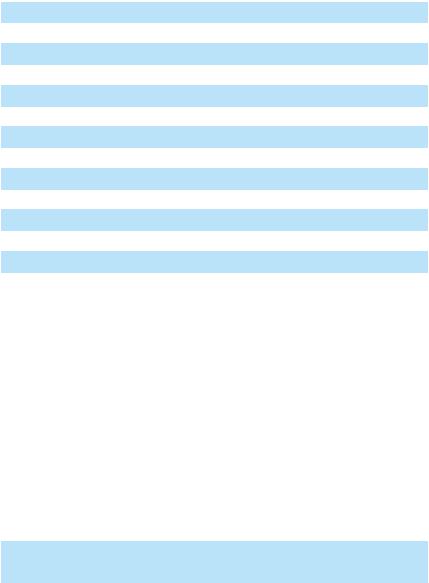
8d) Jog wheel section
Jog wheel - The jog wheel is used for various purposes specific to the
DAW application, including shuttle and scrubbing functions.
Scrub button - The SCRUB button is typically used in conjunction with the
jog wheel to scrub selected audio tracks for editing and auditioning
purposes.
8e) Transport control buttons section
PLAY button - Activate the play function of the DAW.STOP button - Activate the stop function of the DAW.REC button - Activate the record function of the DAW.
REWIND button - Activate the rewind function of the DAW.
FAST FORWARD button - Activate the fast forward function of the DAW.LOOP button - Activate the loop function of the DAW.
Marker button - Toggle small Marker mode.Nudge - Toggle small Nudge mode.
Click - Toggle playback or record metronome click.Drop - Toggle Drop.
Replace - Toggle Replace.
Solo - Toggle track solo (of selected track).Save - Activate DAW save function.
Undo - Activate DAW undo function.
9. DAW Selector section
There is an “auto-detect/manual select” switch located on the back of QconPro X.
Switch to Auto (Auto-Detect mode)
QconPro X will detect which DAW aluminium panel is installed automatically and trigger the settings for that DAW. For example, if the Logic ProTM
aluminium panel is installed on QconPro X, it will automatically load the
Logic Pro settings.
(Tip: Optional DAW panels are available for different DAW’s including:
Nuendo/Cubase, SamplitudeTM, Abelton LiveTM, Logic ProTM, ReaperTM,
BitwigTM, Studio OneTM, ReasonTM and Pro ToolsTM.)
Switch to Manual (Manual-Select mode)
By selecting the correct DAW mode, QconPro X will automatically trigger the
selected DAW settings and works seamlessly with that DAW.
<< / >> buttons - These arrow buttons are used to scroll through the DAW list. The name of the DAW will display on the LCD.
DAW button - Press to enter the DAW selection.
10

To change your Qcon Pro X DAW mode, turn off and on the power switch to
enter the DAW selection mode. Select your desired DAW from the list with
the “<<” / “>>” buttons.
(Tip: DAW button could not be activated if a DAW software is running.)
(Tip: Qcon Pro X will memorise your last selected DAW mode and re-enter the
same mode a few seconds after it has been switched on. (i.e. DAW mode
selection is not needed if the last mode is being used.)
(Note: If “Auto mode” is switched on, <</>> & DAW buttons will be ineffective.)
(Note: We will update Qcon ProX firmware from time to time to support
additional DAW apart from the current existing list. Please check our official
website to download and upgrade your Qcon ProX firmware).
10. Sub-control buttons
This section on control buttons varies depending on which DAW is enabled. Please refer to the text on the PVC overlay or the installed DAW aluminium panel. The
explanation below is based on Logic Pro.
10a) Assignment section
TRACK button - Activate the track parameters of the software.
PAN/EQ/Send/Plug-in/Instrument buttons - These buttons are used to
activate the corresponding effect function of the DAW. They are typically
used in conjunction with the rotary encoder knobs. Press the button, its light
will turn on, and then rotate the rotary encoder knob to adjust the value,
which will display on the LCD directly above.
10b) Automation section
GROUP - Press to enter “Group” edit mode.
READ/Off button - Press the READ button to activate the read function of the current audio track.
WRITE button - Press the WRITE button to activate the write function of the current audio track.
TOUCH button - Press to set selected track’s automation to Touch.
LATCH - Press to set selected track’s automation to Latch.
TRIM - Currently unassigned.
11. User-defined control buttons
This section of control buttons is user-defined in Mackie control mode (HUI mode).
You may set their parameters according to your personal needs. PVC labeling mask is included for noting the set parameters.
11

Rear Panel Layout
9 |
14 |
12 |
13 15 |
||||
|
|
|
|
|
|
|
|
|
|
|
|
|
|
|
|
12. User A / User B RCA connectors
These RCA connectors are able to connect to foot pedals to activate your selected functions. To set their parameters, select USER A and USER B parameters at Mackie control mode.
13. USB port
Connect your Qcon Pro X to your Mac/PC via this USB port.
14. 3 x Extension ports
Connect your extension unit such as QconProXS to these ports.
9. Auto/Manual switch
Switch to select trigger DAW mode automatically or manually. For detail, please refer to P.13.
15.12V/2.5A power adaptor
Connect the provided power adaptor here.
(Note: Qcon ProX is not able to work without the provided power adaptor connected. The USB bus power is not able to provide sufficient power supply for
Qcon ProX.)
12
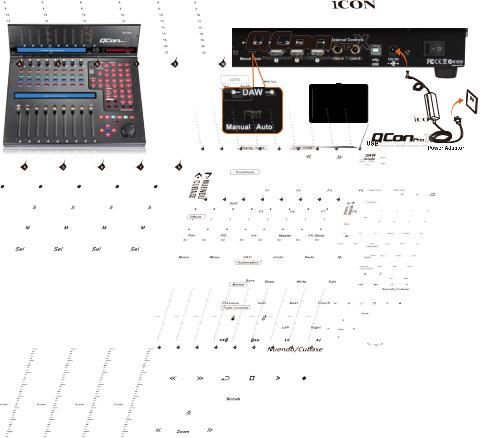
Getting Started
Connecting Your QconPro X Controller
1. Connect the QconPro X to your Mac/PC via the USB port
Choose a USB port on your Mac/PC and insert the wide (flat) end of the USB cable. Connect the cable’s other end to the QconPro X. Your Mac/PC should automatically “detect” the new hardware and notify you that it is ready to use.
2. Select the DAW at QconPro X.
To select DAW mode, you may use automatic or manual select mode. There is an “Auto/Manual” switch located on the back of the QconPro X. Switch to “Auto”
for automatic mode and “Manual” if you want to select DAW manually according to the following steps:
2.1 For Auto mode
If you have switched QconPro X to “Auto” mode. Once you turn on the power switch, QconPro X will trigger the DAW setting according to your installed DAW aluminium panel. You do not need to select anything.
Cubase Mode Selected
4 |
|
3 |
2 |
|
1
1 |
2 |
3 |
4 |
5 |
6 |
13
